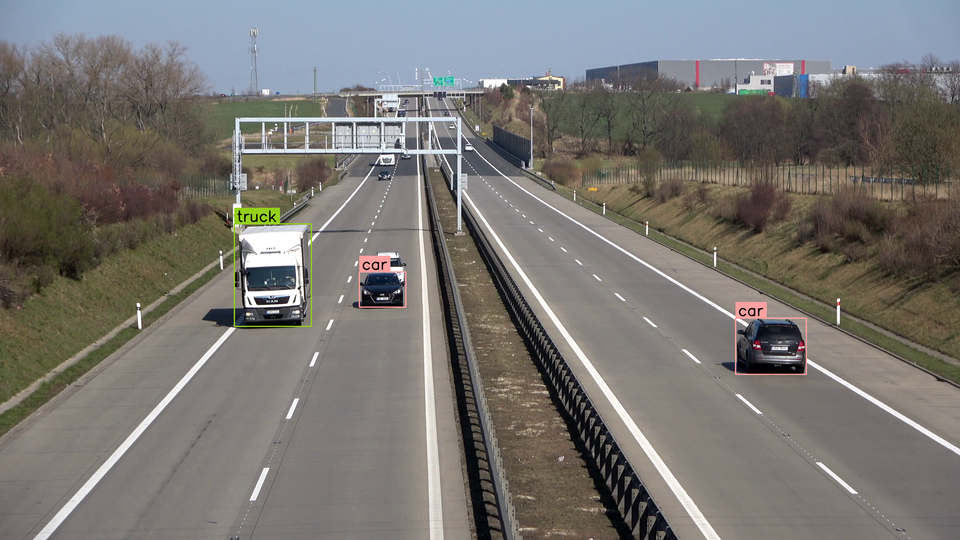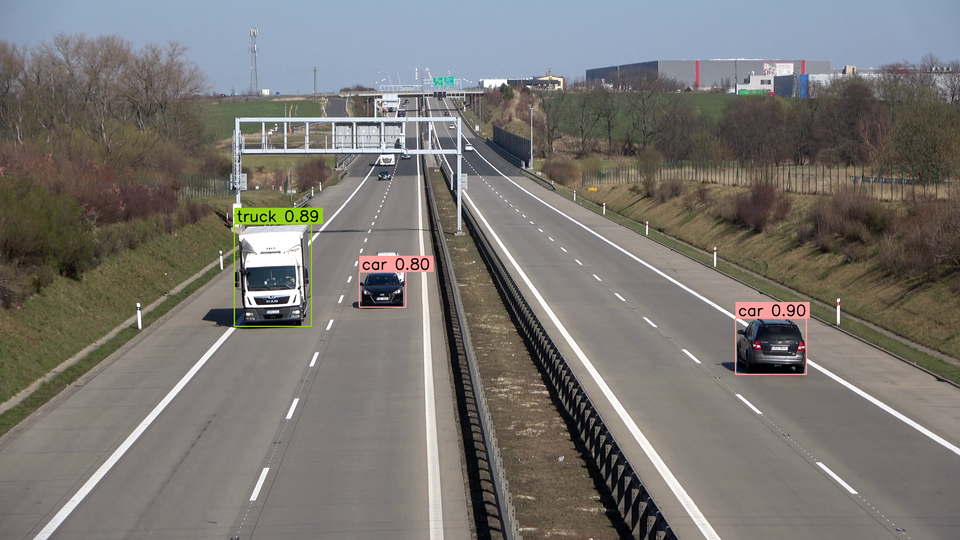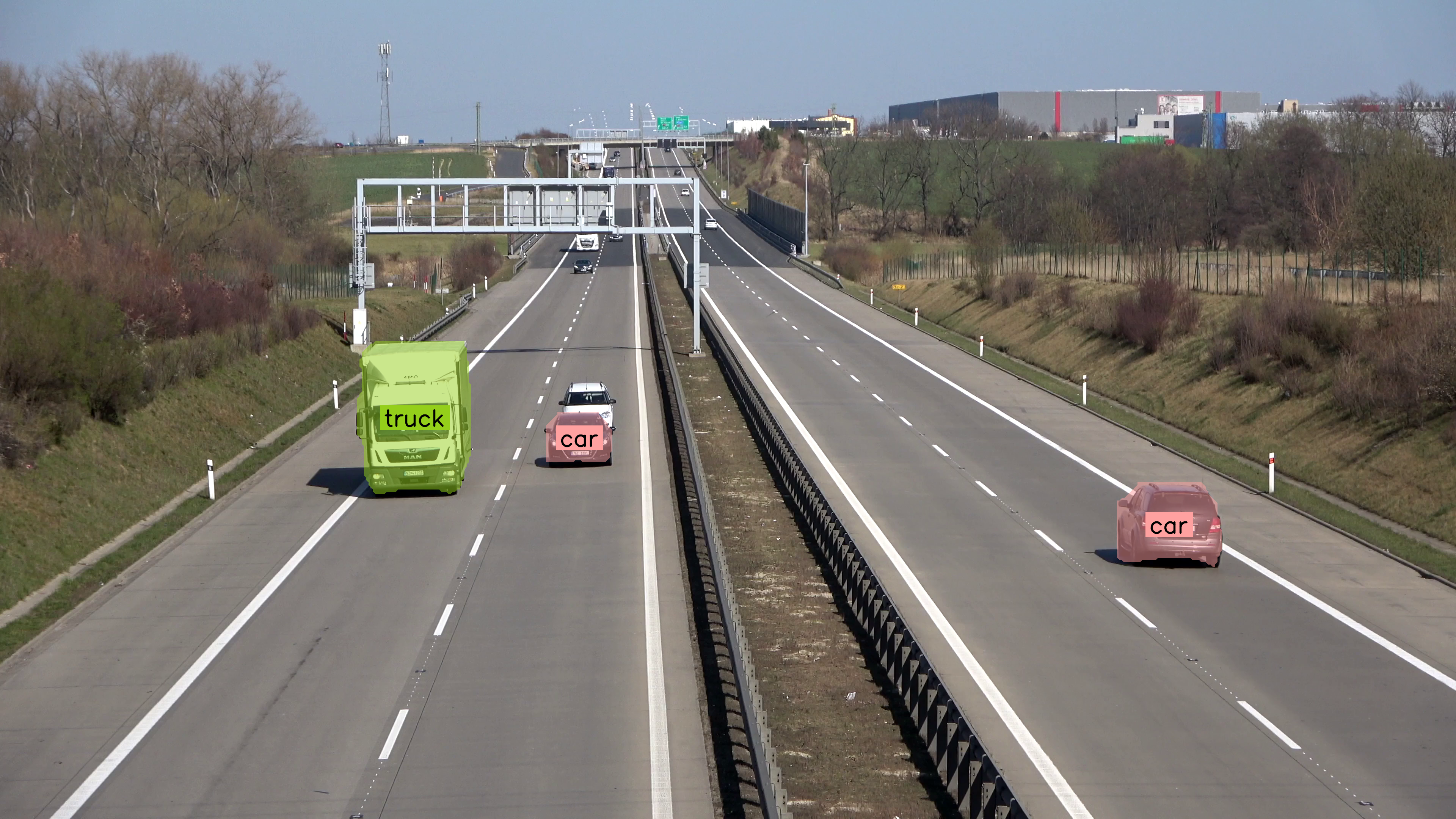Detect and Annotate¶
Supervision provides a seamless process for annotating predictions generated by various object detection and segmentation models. This guide shows how to perform inference with the Inference, Ultralytics or Transformers packages. Following this, you'll learn how to import these predictions into Supervision and use them to annotate source image.

Run Detection¶
First, you'll need to obtain predictions from your object detection or segmentation model.
import torch
from PIL import Image
from transformers import DetrImageProcessor, DetrForObjectDetection
processor = DetrImageProcessor.from_pretrained("facebook/detr-resnet-50")
model = DetrForObjectDetection.from_pretrained("facebook/detr-resnet-50")
image = Image.open(<SOURCE_IMAGE_PATH>)
inputs = processor(images=image, return_tensors="pt")
with torch.no_grad():
outputs = model(**inputs)
width, height = image.size
target_size = torch.tensor([[height, width]])
results = processor.post_process_object_detection(
outputs=outputs, target_sizes=target_size)[0]
Load Predictions into Supervision¶
Now that we have predictions from a model, we can load them into Supervision.
We can do so using the sv.Detections.from_inference method, which accepts model results from both detection and segmentation models.
We can do so using the sv.Detections.from_ultralytics method, which accepts model results from both detection and segmentation models.
We can do so using the sv.Detections.from_transformers method, which accepts model results from both detection and segmentation models.
import torch
import supervision as sv
from PIL import Image
from transformers import DetrImageProcessor, DetrForObjectDetection
processor = DetrImageProcessor.from_pretrained("facebook/detr-resnet-50")
model = DetrForObjectDetection.from_pretrained("facebook/detr-resnet-50")
image = Image.open(<SOURCE_IMAGE_PATH>)
inputs = processor(images=image, return_tensors="pt")
with torch.no_grad():
outputs = model(**inputs)
width, height = image.size
target_size = torch.tensor([[height, width]])
results = processor.post_process_object_detection(
outputs=outputs, target_sizes=target_size)[0]
detections = sv.Detections.from_transformers(
transformers_results=results,
id2label=model.config.id2label)
You can load predictions from other computer vision frameworks and libraries using:
from_deepsparse(Deepsparse)from_detectron2(Detectron2)from_mmdetection(MMDetection)from_sam(Segment Anything Model)from_yolo_nas(YOLO-NAS)
Annotate Image with Detections¶
Finally, we can annotate the image with the predictions. Since we are working with an object detection model, we will use the sv.BoundingBoxAnnotator and sv.LabelAnnotator classes.
import cv2
import supervision as sv
from inference import get_model
model = get_model(model_id="yolov8n-640")
image = cv2.imread(<SOURCE_IMAGE_PATH>)
results = model.infer(image)[0]
detections = sv.Detections.from_inference(results)
bounding_box_annotator = sv.BoundingBoxAnnotator()
label_annotator = sv.LabelAnnotator()
annotated_image = bounding_box_annotator.annotate(
scene=image, detections=detections)
annotated_image = label_annotator.annotate(
scene=annotated_image, detections=detections)
import cv2
import supervision as sv
from ultralytics import YOLO
model = YOLO("yolov8n.pt")
image = cv2.imread(<SOURCE_IMAGE_PATH>)
results = model(image)[0]
detections = sv.Detections.from_ultralytics(results)
bounding_box_annotator = sv.BoundingBoxAnnotator()
label_annotator = sv.LabelAnnotator()
annotated_image = bounding_box_annotator.annotate(
scene=image, detections=detections)
annotated_image = label_annotator.annotate(
scene=annotated_image, detections=detections)
import torch
import supervision as sv
from PIL import Image
from transformers import DetrImageProcessor, DetrForObjectDetection
processor = DetrImageProcessor.from_pretrained("facebook/detr-resnet-50")
model = DetrForObjectDetection.from_pretrained("facebook/detr-resnet-50")
image = Image.open(<SOURCE_IMAGE_PATH>)
inputs = processor(images=image, return_tensors="pt")
with torch.no_grad():
outputs = model(**inputs)
width, height = image.size
target_size = torch.tensor([[height, width]])
results = processor.post_process_object_detection(
outputs=outputs, target_sizes=target_size)[0]
detections = sv.Detections.from_transformers(
transformers_results=results,
id2label=model.config.id2label)
bounding_box_annotator = sv.BoundingBoxAnnotator()
label_annotator = sv.LabelAnnotator()
annotated_image = bounding_box_annotator.annotate(
scene=image, detections=detections)
annotated_image = label_annotator.annotate(
scene=annotated_image, detections=detections)

Display Custom Labels¶
By default, sv.LabelAnnotator
will label each detection with its class_name (if possible) or class_id. You can
override this behavior by passing a list of custom labels to the annotate method.
import cv2
import supervision as sv
from inference import get_model
model = get_model(model_id="yolov8n-640")
image = cv2.imread(<SOURCE_IMAGE_PATH>)
results = model.infer(image)[0]
detections = sv.Detections.from_inference(results)
bounding_box_annotator = sv.BoundingBoxAnnotator()
label_annotator = sv.LabelAnnotator()
labels = [
f"{class_name} {confidence:.2f}"
for class_name, confidence
in zip(detections['class_name'], detections.confidence)
]
annotated_image = bounding_box_annotator.annotate(
scene=image, detections=detections)
annotated_image = label_annotator.annotate(
scene=annotated_image, detections=detections, labels=labels)
import cv2
import supervision as sv
from ultralytics import YOLO
model = YOLO("yolov8n.pt")
image = cv2.imread(<SOURCE_IMAGE_PATH>)
results = model(image)[0]
detections = sv.Detections.from_ultralytics(results)
bounding_box_annotator = sv.BoundingBoxAnnotator()
label_annotator = sv.LabelAnnotator()
labels = [
f"{class_name} {confidence:.2f}"
for class_name, confidence
in zip(detections['class_name'], detections.confidence)
]
annotated_image = bounding_box_annotator.annotate(
scene=image, detections=detections)
annotated_image = label_annotator.annotate(
scene=annotated_image, detections=detections, labels=labels)
import torch
import supervision as sv
from PIL import Image
from transformers import DetrImageProcessor, DetrForObjectDetection
processor = DetrImageProcessor.from_pretrained("facebook/detr-resnet-50")
model = DetrForObjectDetection.from_pretrained("facebook/detr-resnet-50")
image = Image.open(<SOURCE_IMAGE_PATH>)
inputs = processor(images=image, return_tensors="pt")
with torch.no_grad():
outputs = model(**inputs)
width, height = image.size
target_size = torch.tensor([[height, width]])
results = processor.post_process_object_detection(
outputs=outputs, target_sizes=target_size)[0]
detections = sv.Detections.from_transformers(
transformers_results=results,
id2label=model.config.id2label)
bounding_box_annotator = sv.BoundingBoxAnnotator()
label_annotator = sv.LabelAnnotator()
labels = [
f"{class_name} {confidence:.2f}"
for class_name, confidence
in zip(detections['class_name'], detections.confidence)
]
annotated_image = bounding_box_annotator.annotate(
scene=image, detections=detections)
annotated_image = label_annotator.annotate(
scene=annotated_image, detections=detections, labels=labels)

Annotate Image with Segmentations¶
If you are running the segmentation model
sv.MaskAnnotator
is a drop-in replacement for
sv.BoundingBoxAnnotator
that will allow you to draw masks instead of boxes.
import cv2
import supervision as sv
from inference import get_model
model = get_model(model_id="yolov8n-seg-640")
image = cv2.imread(<SOURCE_IMAGE_PATH>)
results = model.infer(image)[0]
detections = sv.Detections.from_inference(results)
mask_annotator = sv.MaskAnnotator()
label_annotator = sv.LabelAnnotator(text_position=sv.Position.CENTER_OF_MASS)
annotated_image = mask_annotator.annotate(
scene=image, detections=detections)
annotated_image = label_annotator.annotate(
scene=annotated_image, detections=detections)
import cv2
import supervision as sv
from ultralytics import YOLO
model = YOLO("yolov8n-seg.pt")
image = cv2.imread(<SOURCE_IMAGE_PATH>)
results = model(image)[0]
detections = sv.Detections.from_ultralytics(results)
mask_annotator = sv.MaskAnnotator()
label_annotator = sv.LabelAnnotator(text_position=sv.Position.CENTER_OF_MASS)
annotated_image = mask_annotator.annotate(
scene=image, detections=detections)
annotated_image = label_annotator.annotate(
scene=annotated_image, detections=detections)
import torch
import supervision as sv
from PIL import Image
from transformers import DetrImageProcessor, DetrForSegmentation
processor = DetrImageProcessor.from_pretrained("facebook/detr-resnet-50-panoptic")
model = DetrForSegmentation.from_pretrained("facebook/detr-resnet-50-panoptic")
image = Image.open(<SOURCE_IMAGE_PATH>)
inputs = processor(images=image, return_tensors="pt")
with torch.no_grad():
outputs = model(**inputs)
width, height = image.size
target_size = torch.tensor([[height, width]])
results = processor.post_process_segmentation(
outputs=outputs, target_sizes=target_size)[0]
detections = sv.Detections.from_transformers(
transformers_results=results,
id2label=model.config.id2label)
mask_annotator = sv.MaskAnnotator()
label_annotator = sv.LabelAnnotator(text_position=sv.Position.CENTER_OF_MASS)
labels = [
f"{class_name} {confidence:.2f}"
for class_name, confidence
in zip(detections['class_name'], detections.confidence)
]
annotated_image = mask_annotator.annotate(
scene=image, detections=detections)
annotated_image = label_annotator.annotate(
scene=annotated_image, detections=detections, labels=labels)
